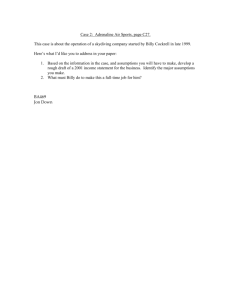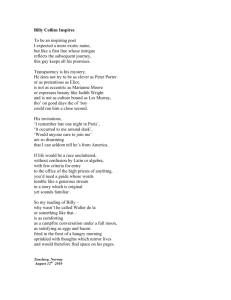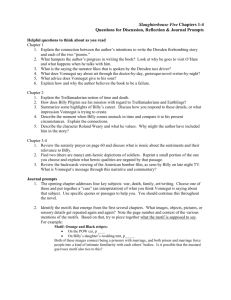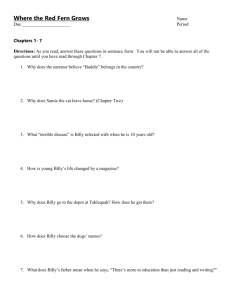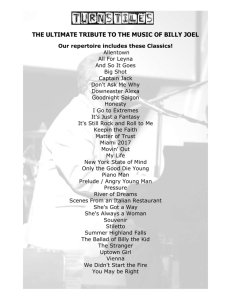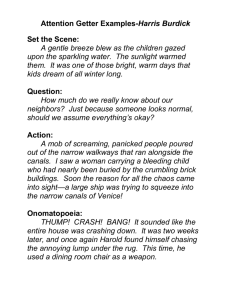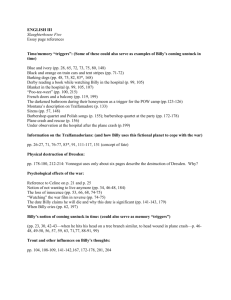Data Sheet - Slaughterhouse Five
advertisement
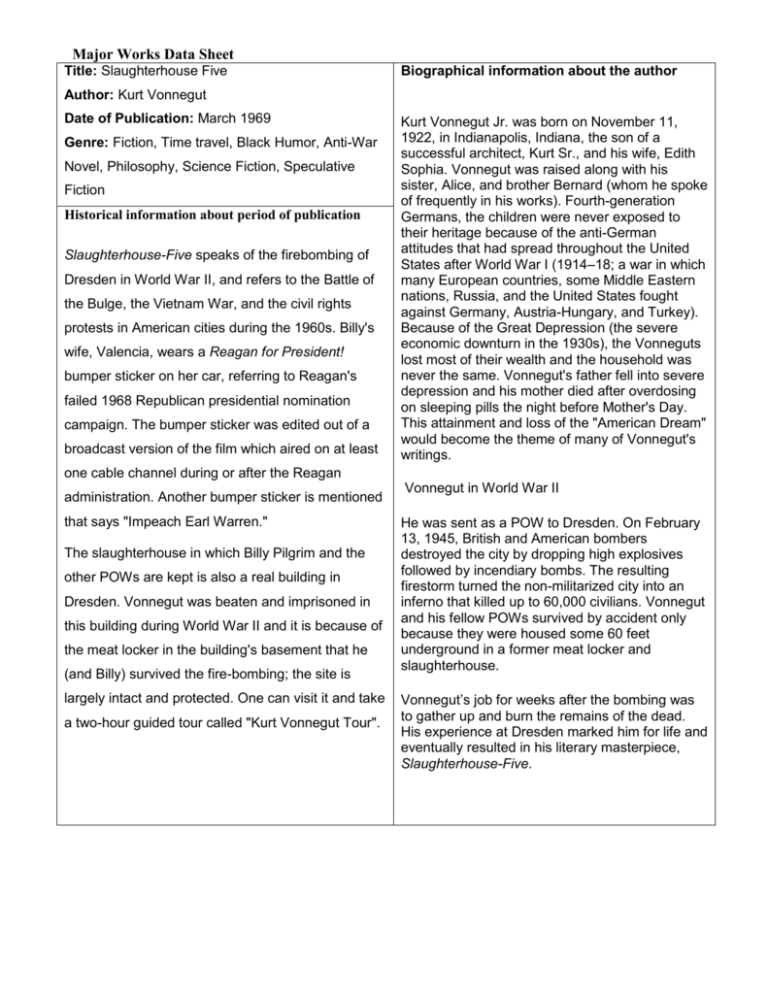
Major Works Data Sheet Title: Slaughterhouse Five Biographical information about the author Author: Kurt Vonnegut Date of Publication: March 1969 Genre: Fiction, Time travel, Black Humor, Anti-War Novel, Philosophy, Science Fiction, Speculative Fiction Historical information about period of publication Slaughterhouse-Five speaks of the firebombing of Dresden in World War II, and refers to the Battle of the Bulge, the Vietnam War, and the civil rights protests in American cities during the 1960s. Billy's wife, Valencia, wears a Reagan for President! bumper sticker on her car, referring to Reagan's failed 1968 Republican presidential nomination campaign. The bumper sticker was edited out of a broadcast version of the film which aired on at least Kurt Vonnegut Jr. was born on November 11, 1922, in Indianapolis, Indiana, the son of a successful architect, Kurt Sr., and his wife, Edith Sophia. Vonnegut was raised along with his sister, Alice, and brother Bernard (whom he spoke of frequently in his works). Fourth-generation Germans, the children were never exposed to their heritage because of the anti-German attitudes that had spread throughout the United States after World War I (1914–18; a war in which many European countries, some Middle Eastern nations, Russia, and the United States fought against Germany, Austria-Hungary, and Turkey). Because of the Great Depression (the severe economic downturn in the 1930s), the Vonneguts lost most of their wealth and the household was never the same. Vonnegut's father fell into severe depression and his mother died after overdosing on sleeping pills the night before Mother's Day. This attainment and loss of the "American Dream" would become the theme of many of Vonnegut's writings. one cable channel during or after the Reagan administration. Another bumper sticker is mentioned that says "Impeach Earl Warren." The slaughterhouse in which Billy Pilgrim and the other POWs are kept is also a real building in Dresden. Vonnegut was beaten and imprisoned in this building during World War II and it is because of the meat locker in the building's basement that he (and Billy) survived the fire-bombing; the site is largely intact and protected. One can visit it and take a two-hour guided tour called "Kurt Vonnegut Tour". Vonnegut in World War II He was sent as a POW to Dresden. On February 13, 1945, British and American bombers destroyed the city by dropping high explosives followed by incendiary bombs. The resulting firestorm turned the non-militarized city into an inferno that killed up to 60,000 civilians. Vonnegut and his fellow POWs survived by accident only because they were housed some 60 feet underground in a former meat locker and slaughterhouse. Vonnegut’s job for weeks after the bombing was to gather up and burn the remains of the dead. His experience at Dresden marked him for life and eventually resulted in his literary masterpiece, Slaughterhouse-Five. Characteristics of the genre: Slaughterhouse-Five is a anti-war science fiction book with elements of dark comedy and meta-fiction. Kurt Vonnegut uses the characteristics of this genre to successfully write a famous and controversial novel. The book is an autobiography of Kurt Vonnegut’s life following the firebombing of Dresden, with Billy symbolically representing all the characters that Vonnegut came across during World War II. He also uses Billy to explain the events that he cannot. Since Billy, like Vonnegut is unable to describe the horrendous events that had occured, science fiction was used to present a fictional, utopian place where Billy could recall the war. That is why he can describe the war better to Montana Wildhack in the Tralfamadorian zoo than to his wife on their honeymoon. The novel is also filled with dark humour to illustrate the funny, yet cruel nature of war, the most famous example being “So it goes”, which is repeated 106 times. Interestingly, Vonnegut drew attention in the first and last chapters to the fact that Slaughterhouse-Five is indeed a book, traits typical to a 20th century “postmodern” metafictional book. This in part was to make us understand that we stare at reality and yet treat a something distant, not related to us. Plot summary Billy Pilgrim is born in 1922 and grows up in Ilium, New York. A funny-looking, weak youth, he does reasonably well in high school, enrolls in night classes at the Ilium School of Optometry, and is drafted into the army during World War II. He trains as a chaplain’s assistant in South Carolina, where an umpire officiates during practice battles and announces who survives and who dies before they all sit down to lunch together. Billy’s father dies in a hunting accident shortly before Billy ships overseas to join an infantry regiment in Luxembourg. Billy is thrown into the Battle of the Bulge in Belgium and is immediately taken prisoner behind German lines. Just before his capture, he experiences his first incident of time—shifting: he sees his entire life, from beginning to end, in one sweep. Billy is transported in a crowded railway boxcar to a prisoner’s camp in Germany. Upon his arrival, he and the other privates are treated to a feast by a group of fellow prisoners, who are English officers who were captured earlier in the war. Billy suffers a breakdown and gets a shot of morphine that sends him time traveling again. Soon he and the other Americans travel onward to the beautiful city of Dresden, still relatively untouched by wartime privation. Here the prisoners must work for their keep at various labors, including the manufacture of a nutritional malt syrup. Their camp occupies a former slaughterhouse, which was named Slaughterhouse Five in English. One night, Allied forces carpet bomb the city, then drop incendiary bombs to create a firestorm that sucks most of the oxygen into the blaze, asphyxiating or incinerating roughly 130,000 people. Billy and his fellow POWs survive in an airtight meat locker. They emerge to find a moonscape of destruction, where they are forced to excavate corpses from the rubble. Several days later, Russian forces capture the city, and Billy’s involvement in the war ends. Billy returns to Ilium and finishes optometry school. He gets engaged to Valencia Merble, the obese daughter of the school’s founder. After a nervous breakdown, Billy commits himself to a veterans’ hospital and receives shock treatments. During his stay in the mental ward, a fellow patient named Eliot Rosewater introduces Billy to the science fiction novels of a writer named Kilgore Trout. After his recuperation, Billy gets married. His wealthy father-in-law sets him up in the optometry business, and Billy and Valencia raise two children and grow rich. Billy acquires the trappings of the suburban American dream: a Cadillac, a stately home with modern appliances, a bejeweled wife, and the presidency of the Lions Club. He is not aware of keeping any secrets from himself, but at his eighteenth wedding anniversary party, the sight of a barbershop quartet makes him break down because it triggers a memory of Dresden. The night after his daughter’s wedding in 1967, as he later reveals on a radio talk show, Billy is kidnapped by two-foot-high aliens who resemble upside-down toilet plungers, who he says are called Tralfamadorians. They take him in their flying saucer to the planet Tralfamadore, where they mate him with a movie actress named Montana Wildhack. She, like Billy, has been brought from Earth to live under a transparent dome in a zoo where Tralfamadorians can observe extraterrestrial curiosities. The Tralfamadorians explain to Billy their perception of time, how its entire sweep exists for them simultaneously in the fourth dimension. When someone dies, that person is simply dead at a particular time. Somewhere else and at a different time he or she is alive and well. Tralfamadorians prefer to look at life’s better moments. When he returns to Earth, Billy initially says nothing of his experiences. In 1968, he gets on a chartered plane to go to an optometry conference in Montreal. The plane crashes into a mountain, and, among the optometrists, only Billy survives. A brain surgeon operates on him in a Vermont hospital. On her way to visit him there, Valencia dies of accidental carbon monoxide poisoning after crashing her car. Billy’s daughter places him under the care of a nurse back home in Ilium. But he feels that the time is ripe to tell the world what he has learned. Billy has foreseen this moment while time-tripping, and he knows that his message will eventually be accepted. He sneaks off to New York City, where he goes on a radio talk show. Shortly thereafter, he writes a letter to the local paper. His daughter is at her wit’s end and does not know what to do with him. Billy makes a tape recording of his account of his death, which he predicts will occur in 1976 after Chicago has been hydrogen-bombed by the Chinese. He knows exactly how it will happen: a vengeful man, named Paul Lazzaro he knew in the war will hire someone to shoot him. Billy adds that he will experience the violet hum of death and then will skip back to some other point in his life. At the end Vonnegut emphasizes that life is a meaningless limerick, so Billy hears the bird still asking the same meaningless question, “Poo-tee-weet?” Describe the author’s style Kurt Vonnegut wrote Slaughterhouse-Five in a dark, stark tone. This is evident from Vonnegut’s constant poking at the nature of war. When Pilgrim met the Tralfamadorians, they told him that their chapters were like telegrams; to convey the plot and nothing else. Vonnegut takes a similar approach and keeps his chapters short, and straightforward. At the same time, Vonnegut applies dark humour to the story, mainly by the apathetic reactions of Billy, and the irony that is present in every paragraph of the book; "I think the climax of the book will be the execution of poor old Edgar Derby," I said. "The irony is so great. A whole city gets burned down, and thousands and thousands of people are killed. And then this one American foot soldier is arrested in the ruins for taking a teapot. And he's given a regular trial, and then he's shot by a firing squad. Thus Slaughterhouse Five is a dark, ironic, and yet apathetic book written in a manner that made this book one of Vonnegut’s and America’s most famous anti-war novels. Examples that demonstrate style The novel's writing is minimalist and dry, and Vonnegut tends to write in short, declarative sentences. Each tiny section is dense with dialogue and action. For example, check out Chapter 3, Section 29 : The war was nearly over. The locomotives began to move east in late December. The war would end in May. German prisons everywhere were absolutely full, and there was no longer any food for the prisoners to eat, and no longer any fuel to keep them warm. And yet – here came more prisoners. (3.29.1) This brief passage tells us (a) when the events of this part of the book are taking place (late December) and (b) what waits in the immediate future (the end of the war). It also outlines the main problems that Billy Pilgrim faces as a POW during this part of the war: (a) there is no room for him in German prisons, (b) there is no food for him to eat, and (c) there is nothing to keep him warm. Memorable quotations 1. “God grant me the serenity to accept the things I cannot change, courage to change the things I can, and wisdom always to tell the difference.” 2. “So it goes.” 3. “‘It was like the moon,’ said Billy Pilgrim.” 4. “And what do the birds say? All there is to say about a massacre, things like ‘Poo-teeweet?’” 5. “He has seen his birth and death many times...” 6. “Mustard gas and roses.” 7. “Blue and Ivory.” 8. “‘Well, here we are, Mr. Pilgrim, trapped in the amber of this moment. There is no why.’” Significance of quotations 1. -shows that Billy doesn’t believe in the Tralfamadorians’ concept of time. been mentioned in reality and in Tralfamadore which proves that his Tralfmadorian experiences are made up 2. -follows every mention of death repetition points out the inevitability of death 3. -describes Dresden and Billy’s feelings Billy felt isolated that he imagined himself on the surface of the moon. 4. -symbolizes lack of anything intelligent to say about war. 5. -death is not something to fear, but not living an active and positive life is. 6. -repetition demonstrates that no part of this story is isolated from another. -shows that war (mustard gas) can destroy anything beautiful (roses) 7. -symbolizes the fragility of the thin membrane between life and death 8. -demonstrates the Tralfmadorians’ concept of time and free will -time is an illusion -free will does not exist. Significance of opening scene The opening scene of Slaughterhouse Significance of closing scene The closing scene of Slaughterhouse Five is Billy Five is Kurt Vonnegut stating that all of Pilgrim and his group emerging from their stable to find the events in the book did happen. The that World War II was over. In a tree a bird looked significance of this is that what is read is down on Billy Pilgrim and said, “Poo-tee-weet?” This all true and should be thought of as such. goes back to the lack of anything intelligent to say about He says, “All this happened, more or less. war. By saying nothing, in this case, the author is saying The war parts, anyway, are pretty much everything that can possibly be said. true.” Symbols Setting The Bird Who Says “Poo-tee-weet?” intelligent to say about war. Birdsong rings out Germany, 1944-45; "Ilium," upstate New York alone in the silence after a massacre, and “Poo- The setting of Slaughterhouse-Five is wide-ranging, but tee-weet?” seems about as appropriate a thing to the two most important places are Germany during say as any, since no words can really describe World War II and "Ilium," the fictional town in upstate the horror of the Dresden firebombing. The bird New York where Billy Pilgrim lives most of his life. The jabbering bird symbolizes the lack of anything sings outside of Billy’s hospital window and again in the last line of the book, asking a question for which we have no answer, just as we have no answer for how such an atrocity as the firebombing could happen. The Colors Blue and Ivory In Germany Billy undergoes the painful experiences of captivity and violence that cause him to start skipping through time. And it's the narrator/author's real-life time in Dresden, Germany, that provokes him to write Slaughterhouse-Five in the first place. In Chapter 1, the narrator tells us that he and his wife spent some time On various occasions in Slaughterhouse-Five, after the war in Schenectady, New York, which Billy Billy’s bare feet are described as being blue and Pilgrim's "Ilium" seems to be based on. The parallels ivory, as when Billy writes a letter in his basement in the cold and when he waits for the flying saucer to kidnap him. These cold, corpselike hues between the narrator and Billy's wartime and postwar experiences add to the sense that Slaughterhouse-Five, for all of its aliens and time travel, is a largely autobiographical novel. suggest the fragility of the thin membrane between life and death, between worldly and otherworldly experience. Another recurring setting throughout the novel is the hospital. Billy spends his first night in the POW camp in The Horses the hospital, where he meets Edgar Derby doped up on morphine. When Billy has his breakdown and checks After the bombing of Dresden, Billy Pilgrim and himself into a veteran's hospital after the war, he meets several POWs return to the slaughterhouse to fellow veteran Eliot Rosewater and discovers the pick up souvenirs. Two German doctors approach science-fiction novels that will help him escape from his him and scold him for the condition of his horses. awful life for the next 30 years. And when Billy is The animals are desperately thirsty, and in their recovering from his plane crash in a hospital in Vermont travel across the ashy rubble of Dresden, their in 1968, he first begins saying the name "Tralfamadore" hooves have cracked and broken so that every aloud. step is agony. The horses are nearly mad with pain. Billy weeps for the first and last time during the war at the sight of these poor, abused animals (9.19-20). These three scenes of recovery strongly associate hospitals with relief. At the same time, these moments of rest from the stresses and memories that are driving him crazy are only temporary. Once Billy leaves the This is the only time in the whole book that Billy hospital, he always loses control again: his release from cries, so this scene is very significant. There is a the prison hospital allows him to be shipped to Dresden; parallels between the horses' suffering and Billy's his departure from the veteran's hospital leads to his own seem striking. These horses have no way of marriage with Valencia and the start of his dreary life as understanding the destruction around them, nor an optometrist; and his escape from the Vermont the orders being given to them. With no way of protesting their treatment, they obediently keep walking through the ruins of Dresden even though every step on the sharp rocks damages their hospital sends him directly into conflict with his daughter, Barbara. While Vonnegut seems to represent the work that doctors do positively, medicine is still not enough to heal Billy of all that ails him. For that, the entire world would need to change. hooves. Like Billy himself, the animals are innocent victims of great suffering without ever Old AP Questions understanding why. Prayer of Serenity Montana Wildhack wears a locket on which is written, "God grant me the serenity to accept the things I cannot change, courage to change the things I can, and wisdom always to tell the difference”The same words appear framed on Billy's optometry office wall.· First, the prayer appears in both Billy's real life and his Tralfamadorian life, strongly hinting that his Tralfamadorian experiences are made up. He has taken bits and pieces from things he has seen in his daily life and read in science fiction novels to make up a world he wants to live in. · Second, this prayer expresses something profound that Billy is really looking for. He does want to find a way to accept what he cannot change (the past), the courage to change what he can (his current reality), and the wisdom to tell the difference. So It Goes · The phrase “So it goes” follows every mention of death in the novel, equalizing all of Possible themes / Topics of discussion 1. Fate and free will Theme: It is said to be an illusion and Billy uses that explanation to escape from reality. In this theme, Vonnegut shows that individuals are free to choose but their decisions cannot change some inevitabilities. -Topics of Discussion: Does Billy Pilgrim exercise his own will at any point in the novel? If so, when? 2. Warfare -Theme: This book is about privates, most of whom don’t want to be on the battlefield. It’s about men who have been deprived of any kind of control on what they do and where they go. -Topics of Discussion: Why does Slaughterhouse Five avoid any direct representations of the battlefield and instead focus on people who are not fighting even though it’s a book about World War II? 3. Time -Theme: Billy is tossed back and forth in time with no control over where he will be from one moment to the next. His only cure was to take refuge in the beliefs of the Tralfmadorians. -Topics of Discussion: How does the Tralfmadorian idea of time appear to affect the very structure of Slaughterhouse Five? 4. Suffering Theme: Much of the suffering in the book seems to target innocents. The injustice of sufferingthat it strikes those who seem least equipped to them, whether they are natural, accidental, or intentional, and whether they occur on a massive scale or on a very personal one.The phrase reflects a kind of comfort in the Tralfamadorian idea that although a person may be dead in a particular moment, he or she is alive in all the other moments of his or her life, which coexist and can be visited over and over through time travel. It tells that death has non meaning or emotion. Sight · Billy is an Optometrist. Billy’s Job is to find different lenses to help his patients see clearly the world around them. · Billy/Vonnegut present the reader with different lenses in order to correct the nearsightedness of the world. Shows the mistakes and the problems in society. deal with it- is another reason Billy turns to science fiction and Tralmadore to make himself a new reality. -Topics of Discussion: Why does Vonnegut spend time on the suffering of animals? 5. Morality and Ethics Theme: Moral lessons were shunned since the Tralfmadorians made it clear that there novels had no moral lessons since you can’t change the future anyway. Vonnegut seems to be asking his readers to do instead is to think about how much human suffering the war brought for both sides. Some of the most evil characters in the book are the most self-assured and that is what leads to war in the first place. Topics of Discussion: Is there moments in the novel where Billy can intervene morally but doesn’t? Why not? Characters Name Role in story Significance Adjectives Billy Pilgrim Kurt Vonnegut Bernard O’Hare -Main Character -Protagonist -Minor Character -Also the author of the novel - fellow POW with Billy Pilgrim Mary O’Hare -Wife of Bernard O’Hare -Believes that the book Slaughterhouse Five will be a heroic war story which will make her children go to war. So she wants the book to be named The Children’s Crusades Tralfamadorians -Toilet plunger shaped aliens -Can see in 4 Dimensions -Take away Billy Pilgrim during his daughter’s wedding day His fragmented experience of time structures the novel as short episodic vignettes and shows how the difficulty of recounting traumatic experiences can require unusual literary techniques. Vonnegut’s commentary as a character and an author enables a more factual interpretation of a story that seems almost preternaturally fictional and adds support to the idea that such fantastical elements may be the reality of a traumatized mind. -O’Hare, a nonfictional character, helps ground SlaughterhouseFive in reality. Vonnegut actually has this other survivor of the firebombing contribute to the research and recollection process involved in creating the book, which allows us to take the novelistic details as fact and appreciate the thoughtful manner in which they are presented. -O’Hare and Vonnegut not remembering the details from the bombing emphasize the theme of destructiveness of war. -Mary hates war, and Vonnegut’s decision to dedicate the novel in part to Mary suggests how deeply he agrees with her that the ugly truth about war must be told. The Tralfamadorians’ philosophies of time and death influence the narrative style of the novel. They perceive time as an assemblage of moments existing simultaneously rather than as a linear progression, and the episodic nature of Slaughterhouse-Five reflects this notion of time. Their acceptance mild-mannered everyman nice adaptive flexible -knowledgeable -wise -friendly -chilly -knowledgeable -understanding of death, which Billy embraces, leads the narrator to remark simply “So it goes” at each mention of death. -Campbell represents all that is wrong with war; he desires to use people for his beliefs. Howard W Campbell Jr -An American who has become a Nazi. Campbell speaks to the prisoners in the slaughterhouse and tries to recruit them for “The Free American Corps,” a German army unit that he is forming to fight the Russians. Werner Gluck -German Slaughterhouse Guard -Young Soldier -wild -evil -inflexible -disloyal -betrayer -Gluck gets his first glimpse of a naked woman along with Billy. Their shared intrigue and interest in the naked female body unites these two men from different sides (America and Germany), reflecting how fundamentally human feelings—such as lust— can make differences in people fall. -energetic -Represents how everyone in war is just trying to be a war hero. Roland Weary Eliot Rosewater -A soldier taken prisoner by the Germans along with Billy. Unlike Billy, who is totally out of place in the war, Weary is a deluded glory-seeker who fancies himself part of the Three Musketeers and saves Billy’s life out of a desire to be heroic. -A war veteran who occupies the bed near Billy in the mental ward of a veterans’ hospital. Like Billy, Rosewater is suffering from the aftereffects of war, and he finds escape—and helps Billy find escape—in the science-fiction novels of Kilgore Trout. -wild -stupid -cruel -psychotic -Signifies how war affects everyone in different ways. -crazy -book-lover -Following the firebombing, Derby is sentenced to die by firing Edgar Derby Wild Bob Valencia Merble Bertram Copeland Rumfoord Lily Rumfoord Robert Pilgrim Barbara Pilgrim -Another survivor of Dresden’s incineration. -Too old to be a soldier -An army colonel in the German rail yard who has lost his mind. Wild Bob asks if Billy belongs to his regiment when, in fact, all his men are dead. -Wife of Billy Pilgrim -Fat and obese, died by accidental carbon monoxide poisoning -A Harvard history professor and the official U.S. Air Force historian who is laid up by a skiing accident in the same Vermont hospital as Billy after his plane crash. -Rumfoord’s young trophy wife and research assistant. -Lily Rumfoord is frightened of Billy. -Billy’s son, who is a failure and a delinquent at school, though he cleans up his life enough to become a Green Beret in the Vietnam War. -Billy’s daughter, newly married at the age of twenty-one, who is faced with the sudden death of her mother and the apparent mental breakdown of her father. squad for plundering a teapot from the wreckage. -His death is anticlimactic, since Billy does not view it with any sense of pathos (emotional appeal) , but rather as something that was inevitable. -He invites everyone to visit him in Wyoming, but his unpredictable death shows how the war makes such gestures both poignant and pointless. - Billy did not want to marry her but he had to due to his ethics and morals. -Signifies how not many people know about the bombing of Dresden through how Rumfoord changes the subject everytime he speaks of it. -She lies silent in the next bed as a symbol of the scope of powerlessness and lack of free will. -Robert’s presence in the story during Billy’s later life helps illustrate the pervasiveness of Billy’s war trauma, especially his inability to communicate and relate to his own son. Robert’s successful self-reformation from delinquency to discipline (in Vietnam) seems to indicate Vonnegut’s acceptance of the inevitability of war. -Barbara represents the follow-up generation to the one ravaged by World War II. While Billy’s ability to function in life and be successful in a career paves the way for Barbara’s development, his war trauma and delusions constantly frustrate her. This signifies how future generations don’t care about the bad stuff, -old -suspicious -wild -stupid -hopeful -over confident -fat -gullible -stupid -loving -annoying -disrespectful -quiet -respectful -no self confidence -wild -free from rules -rebellious -annoying -filled with frustration -care free -uncaring -irresponsible -disrespectful they only prefer to hear all the good stuff. Billy’s Mother Billy’s Father -Billy’s mother is described as a woman “trying to construct a life that made sense from things she found in gift shops” (she once hung a grisly crucifix in Billy’s room but never joined a church because she couldn’t settle on a place of worship). -Billy’s father throws young Billy into the YMCA pool to teach him how to swim. Billy prefers the bottom of the pool, but he is rescued unwillingly from drowning after he loses consciousness. - Signifies how war makes people so different that it’s hard for them to even face their own family, because war has drastically changed them. -This also relates to how countries can not settle on an idea which results in them going to war. -This incident initiates the novel’s theme of the illusory nature of free will. An idea humans believe to be true but the Tralfamadorians decline. -annoying -hyperactive -wild -crazy -psychopath -uncaring -careless -stupid -self-righteous -patriachal
